Eugene C. Figg
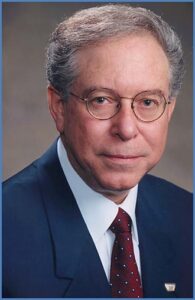
(1936 – 2002)
Eugene C. Figg, Jr. P.E., Citadel Class of ’58, was known professionally as the “Father of Concrete Segmental Bridges in America” having inspired a new industry for bridges throughout the United States. Gene Figg was President and Director of Bridge Art at Figg Engineering Group (FIGG) and under his leadership FIGG achieved an international reputation for designing iconic, award-winning, cost efficient bridges.
Gene dedicated his life to the design of bridges that make a statement and leave a lasting impression. Early in his career he recognized the value and potential of concrete segmental bridge design and pioneered the use of this bridge type in the U.S., beginning with the Seven Mile and Long Key Bridges in the Florida Keys. He believed that bridges could combine both beautiful form and sustainable function, evident in the creation of renowned bridges like those that received the Presidential Award from the President of the United States through the National Endowment of the Arts. These include the I-275 Bob Graham Sunshine Skyway Bridge in Florida, which was the first concrete cable-stayed bridge in the United States with a single pylon and single plane of stays and still holds the record as the longest precast span (1200 ft.) in America; The Blue Ridge Parkway Viaduct around Grandfather Mountain in North Carolina, which introduced progressive placement segmental construction building from the top-down to protect the environment; and the Natchez Trace Parkway Arches with a one of a kind 582 foot precast concrete arch.
- Founder, Figg Engineering Group (1978)
- Founder, American Segmental Bridge Institute & Leadership Award
- Opal Award in Design, the highest honor for lifetime achievement by the American Society of Civil Engineers (2002)
- National Academy of Engineers Inductee – “for leadership… excellence, structural innovation and efficient construction of major bridges.”
- John A. Roebling Medal for Outstanding Lifetime Achievement in Bridge Design, International Bridge Conference (2000)
- Engineering News Record, 1 of 10 Bridge Designers Worldwide Who Made a Difference in the Past 125 Years (2000) (only American-born)
- One of only 9 bridge engineers named to America’s Top 100 Private Sector Transportation Design and Construction Professionals of the 20th Century by the American Road and Transportation Builders
- International Bridge Conference named a bridge award, the Eugene C. Figg Jr. Medal for Signature Bridges, for outstanding achievement in bridge engineering
- Lifetime of engineering service to our nation and his fellow man through society-changing design and construction of bridges.
Bernard M. Gordon
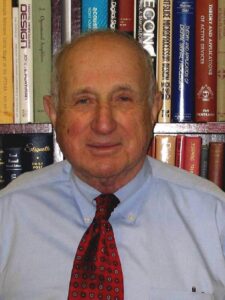
For over fifty years, Bernard M. Gordon and the teams of engineers he has led have conceived, invented, and developed myriad pioneering high-technology devices and equipment contributing to major advances in the fields of industrial instrumentation, medical imaging, computer systems, aerospace telemetry, and communications. Founder and Chairman Emeritus of the Board of Analogic Corporation, Bernard Gordon is often called the “father” of modern analog-to-digital conversion for his many contributions to the technologies that help enrich our lives. Presently, Chairman of NeuroLogica Corporation, involved in advanced brain imaging, he remains as active, entrepreneurial innovator.
Awarded the National Medal of Technology by President Reagan in 1986, and elected to the National Academy of Engineering in 1991, Gordon has been honored by the Engineering Societies of New England, the Institute of Electrical and Electronic Engineers, the Franklin Institute, the Museum of Science, and Eta Kappa Nu among others.
From his earliest contributions to the development of UNIVAC – the world’s first commercial digital computer – and to the first alphanumeric dot matrix display, to scanning devices that would become the central core of modern medical imaging and counter-terrorism technology, Gordon has represented the key creative and essential role of the engineer in the development of new technology.
His concern for the education of engineering leaders led to the establishment of the Tufts Gordon Institute. He holds B.S. and M.S. degrees from MIT and several honorary doctorate degrees in engineering and science.
Major General Caroll LeTellier
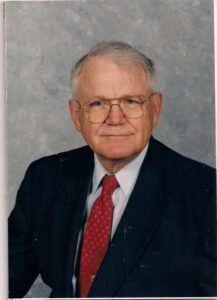
Carroll LeTellier, Citadel Class of ’49, has been uniquely connected with civil engineering and The Citadel his entire life. He was born in Charleston and lived at The Old Citadel from 1928 to 1931 when he moved to the new Citadel campus until graduating in 1949. He served in the US Army for 27 years, attaining the rank of Major General in the Corps of Engineers. During this period, he met and married Frances Melsheimer of Vicksburg, Mississippi. General LeTellier’s six overseas assignments included three in the Far East (one in Korea, two in Vietnam all during those wars) and three in Europe/Middle East. Upon his retirement from the military in 1976, he joined Sverdrup Corporation, then the sixth largest architect/engineer company in the United States. He served as Vice President until retiring to South Carolina in 1993. 1998 marked his return to full time status as a Vice President. He finally retired in September 2002.
His career included involvement in a long list of major projects, some of the most notable are: Tennessee-Tombigbee Waterway, Santee-Cooper Re-diversion Canal and Power Plant, Fort McHenry Tunnel, building or upgrading 44 US Embassies worldwide, and preliminary design of the cable stayed bridge in Charleston. General LeTellier has received numerous awards and honors during his career in the military and private industry. He received the U.S. Army Distinguished Service Medal plus 5 awards each of the Legion of Merit, the Bronze Star and the Air Medal. In 2003 he was inducted into the National Academy of Engineering, acknowledging him as one of 212 civil engineer members who significantly contributed to their profession. The Citadel recognized General LeTellier with an Honorary Doctorate in Civil Engineering in 1999 and later with its Palmetto Medal. He has served on the Department of Civil and Environmental Engineering Advisory Council since its inception in 1996 and the School of Engineering Advisory Board since its inception in 2010.
For exemplary service to the college, he was recognized as Alumnus of the Year in 1998 by The Citadel Alumni Association. Col. Dennis Fallon, former Dean of the School of Engineering at The Citadel and Louis S. LeTellier Chair stated, “Carroll LeTellier, through his philanthropic efforts (time, leadership and resources), has significantly impacted the educational environment at The Citadel. The School of Engineering is extremely fortunate to have him as a supporter, an alumnus, an advisor and a friend.”
Colonel Louis S. LeTellier
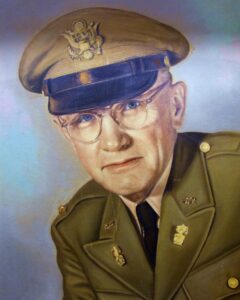
(1887 – 1975)
Colonel Louis S. LeTellier was born on February 8, 1887 near Charlottesville, Virginia. He attended the University of Virginia and received a Master of Science degree from the College of Charleston. He joined The Citadel faculty in 1908 as Professor of Drawing where he taught drawing and other engineering subjects. In 1920 he became the Head of the Department of Civil Engineering. His life and that of his wife, Vivian Nance, was committed to The Citadel and the promotion of Engineering Education. He was most proud of the fact that The Citadel Department of Engineering was the first in South Carolina to be accredited in 1936. He was equally proud to assist Clemson in becoming accredited. For his work he was rewarded with an Honorary Doctor of Engineering from that Institution. The same year he was honored with an Honorary Doctor of Laws from The Citadel.
In addition to his primary responsibility of teaching, he was the assistant football coach for five years, the head coach in 1910 and 1911, organized the track team and coached for 6 years, and was Chairman of the Faculty Committee on Athletics and the College representative on the Southern Intercollegiate Athletic Association. He assisted in founding The Round Table and the Bulldog (now The Brigadier). He organized and operated the Placement Bureau for graduates of the College. In 1951 he was made an honorary life member of The Citadel Alumni Association. During his 46 years at The Citadel he maintained a close relationship with the engineering industry. In 1922 he resigned from the State Board of Architectural Examiners to take a position on the newly created Board of Engineering examiners. He was the second licensed engineer in South Carolina and in 1942 he was awarded the Distinguished Service Certificate of the National Council of the State Board of Engineering Examiners. He was a member of the visiting committee to determine the award of engineering school accreditation.
He served as the President of the South Carolina Section of the American Society of Civil Engineers, later served as its Chairman on Engineering Education, and then was elected as it Chairman of its Civil Engineering Division. In 1946 he was elected to the General Council of the American Society of Engineering Education. During the height of the expansion prior to World War II, he in essence acted as The Citadel’s Director of Construction. Among those buildings was the home of the Civil and Environmental Engineering Department, constructed in 1937. He became Acting President of The Citadel for a year awaiting the arrival of General Mark Clark. He was Dean of the College for a short while before his retirement in 1954. The Board of Visitors of 1954 recognized the achievements of this remarkable man in deep appreciation for his unselfish contributions to The College and to the Engineering Profession.
Jack McCormac
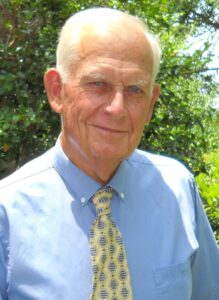
Jack McCormac, a native of Columbia, graduated from The Citadel in 1948 with a B.S. in Civil Engineering. Most of his career was spent attempting to teach Civil Engineering at Clemson University. While at Clemson and since his retirement he has published seven engineering textbooks of which there are 38 editions. During the last four years he has published four detective novels.
Jack was a member of the South Carolina State Board of Registration for Engineers and Land Surveyors for ten years and was chairman of the board for two of those years. Perhaps his greatest honor was his selection in 1999 by Engineering News Record as one of the top 125 engineers or architects in the world over the preceding 125 years for contributions to the construction industry. He is also particularly proud of the fact that in 2001 he was presented the LeTellier Cup awarded for a lifetime of contributions to the Civil Engineering and Land Surveying professions. During his cadet days at The Citadel he was a great admirer of Colonel LeTellier and that admiration has continued until today.
Clayton R. Paul
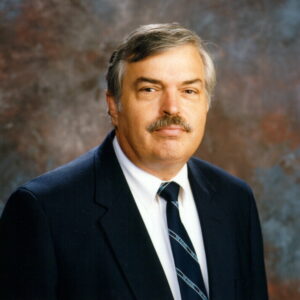
(1941 – 2012)
Born and raised in Macon, Georgia, Dr. Clayton R. Paul received the Bachelor of Science in Electrical Engineering as a member of The Citadel Class of 1963, his Masters of Science in Electrical Engineering at the Georgia Institute of Technology in 1964, and PhD in Electrical Engineering from Purdue in 1970. He then became perhaps the most accomplished Citadel Electrical Engineering academician ever. During 49 years teaching electrical engineering at the University of Kentucky and as the Sam Nunn Eminent Professor of Aerospace Engineering and Professor of Electrical Engineering at Mercer University, Dr. Paul set the life course for countless students. His astounding publication record of 19 textbooks and over 200 technical papers, symposium proceedings and technical reports continued after his death with a final book by John Wiley and Sons in 2012 entitled “Transmission Lines in Digital Systems for EMC Practitioners”. Dr. Paul knew his stuff, which was the theory and practice of electromagnetics, and knew how to communicate it to those who needed to understand this complex but critical subject matter.
A lifetime fellow of the Institute of Electrical and Electronic Engineers (the IEEE), Dr. Paul was awarded that organization’s prestigious Electromagnetics Award in 2005, recognized as the 2007 IEEE Undergraduate Teacher of the Year and inducted into the IEEE Electromagnetic Compatibility Society Hall of Fame in 2011. It has been often said that Dr. Clayton Paul was the go-to person for all things Electromagnetic. Dr. Paul’s accomplishments extended beyond engineering as an active FAA Certified Flight Instructor and FAA Advanced Ground and Instrument Instructor. In his “spare” time, Dr. Paul had a passion for bluegrass music extending back to his Purdue days when he performed with the Chestnut Hill Boys Bluegrass Music Band, and with a number of bands since, including recordings with Bob Anderson and the Country Ramblers old time string band.
Finally Dr. Clayton Paul was a great friend of Electrical Engineering at The Citadel, serving on the ECE Advisory Board since 2001 and gifting the department not only financially but by directing his most exceptional PhD student to our department to become an outstanding Citadel ECE faculty member for more than 15 years. Few individuals are as accomplished in all facets of life as was Dr. Clayton Paul. The Citadel is fortunate to have been part of his distinguished life.
